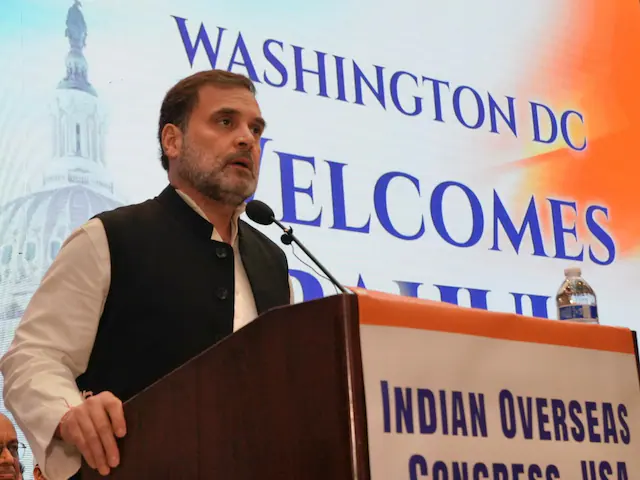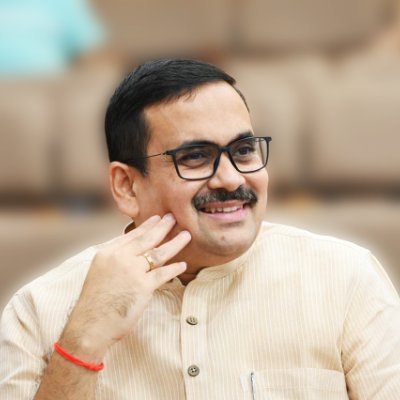Rahul Gandhi, along with his minders and advisers in the Congress, believes that the grammar of anarchy will revive the Congress, help it win more seats, and expand its political footprint across the country.
The script that Rahul Gandhi reads on foreign soil is rooted in a grammar of anarchy. In adhering to this script, he has remained consistent and persistent over the last decade. The only difference is that the script, the argument, the content, and the delivery have become increasingly anarchic and devoid of real thought and ideas.
Rahul Gandhi, along with his minders and advisers in the Congress, believes that the grammar of anarchy will revive the Congress, help it win more seats, and expand its political footprint across the country. This belief has been lent credence by academics and ideologues in the West. Gatekeepers of India studies abroad, such as Christophe Jaffrelot, Sunil Khilnani, and Shruti Kapila, to name a few, seem to have put considerable effort and thought into developing the Congress’s and Rahul Gandhi’s post-2014 grammar and lexicon of anarchy. It is a well-coordinated group, working in concert with one another, that has pushed Rahul to spew venom towards the RSS during his addresses, both in India and particularly when abroad.
The roots of this mindset can be traced back to Rahul’s great-grandfather. Unable to prove allegations of the RSS’s involvement in Mahatma Gandhi’s assassination, a desperate Pandit Nehru made it a habit to launch a vituperative campaign against Guruji Golwalkar and the RSS. Manmohan Vaidya, in his thought-provoking study, We and the World Around, essentially a detailed and varied articulation of the RSS’s contemporary worldview, argues that this marked “the beginning of the dirty politics of hate by the Congress in independent India.” Rahul carries forward that legacy.
Ironically, while the Congress struggles to stay afloat and relevant, battling an internal hollowing out, the RSS is well on its way to commemorating the centenary of its founding. “No opponent of the Sangh,” notes Vaidya, “has displayed the requisite intellectual rigour to study Guruji [M.S. Golwalkar] and his ideas in depth before lifting the pen to write on him” or on the Sangh. The Congress’s choice of a “dynastic, regional, and caste-based model of politics,” Vaidya argues, has “left the Congress and all other parties, except the BJP, with no original thinkers, and hence, they rely solely on left-leaning communist ideologues as party thinkers and intelligentsia.”
Make no mistake, much of the gibberish that Rahul utters comes from the Communist ideological stable. It is no coincidence that Rahul’s comments on the Sikhs, Indian states, the RSS, and his favoured concept of India as a ‘Union of States’—his favourite imagined structure of India that he keeps regurgitating —find ready and willing support from the likes of comrade D. Raja of the CPI. The formulation that India is a ‘Union of States’ appeals to the CPI, as it reminds them of the Adhikari thesis, which spoke of India being a congeries of seventeen states, each of whom should be granted freedom when independence comes.
One is reminded of the Jaipur Literature Festival (JLF) some years ago, where the then RSS General Secretary, Dattatreya Hosabale, and Manmohan Vaidya were invited to speak at a session. Two Politburo leaders of the CPI(M) boycotted the event because the RSS was given a platform to share its views. “Their elitist definition of free expression,” recalls Vaidya, “excludes even an attempt to understand such an organisation. But what precipitates these protests? It is their fear that, should the RSS be given an opportunity to reach a larger audience, the veil of misunderstanding will fall off, and their lies will be exposed. People will know the truth, and that is their greatest fear of all.”
The Communists’ ‘ideological intolerance and exclusion’ also percolated into the Congress. While professing liberalism, free thought, the need for dialogue, and space for differences, the Congress, the Left parties, and their ecosystem have spawned an intolerant and exclusionary system that brooks no space for differing ideas.
It was Sunil Khilnani who coined the term ‘Idea of India’, but in reality, what it meant was that there could be only one idea of India. In that schema, there was no space for multiple ‘ideas’ of India. Anyone or any entity questioning that ‘Idea’ of India would be pilloried, cornered, and boycotted. This “fascist opposition to free speech,” Vaidya points out, is “entirely against Bharatiya thought.” Rahul Gandhi will not tell his foreign audience that, in India, his party and its political and intellectual allies never engage with intellectual opponents.
In fact, the opponents of the Sangh, whether from the Congress or the Communists, have displayed acute intellectual dishonesty by refusing to sincerely examine the text and subtext of the RSS’s narrative before taking positions against it.
Rahul Gandhi, with his meagre reading, perhaps wouldn’t know that in another time, Congress stalwart and scholar-politician Dr Sampurnanand—former Chief Minister of Uttar Pradesh, educationist, and Chancellor of Kashi Vidyapith—wrote a moving foreword to Pandit Deendayal Upadhyaya’s collection of political columns that had appeared in the RSS-inspired weekly Organiser.
That foreword to Upadhyaya’s book is available for all to read. “Shri Deendayal Upadhyaya,” wrote Dr Sampurnanand, “was one of the great leaders of the Jana Sangh, and I have been, throughout my political career, a member of the Congress. In these circumstances, it might sound surprising to some that such a request should have been made and accepted. I can understand this, but in fact, it is simply an expression of that great virtue of tolerance which we all must learn to practise if democracy is to take root in our country.”
Those, Dr Sampurnanand observed, “who are interested only in gaining victories over others can be of no help in the service of democracy.” Offering a moving tribute to Deendayal Upadhyaya, Sampurnanand wrote, “The thoughts of the late Shri Deendayal Upadhyaya… are not just anybody’s thoughts. These words clothe the ideas of one of the most notable political leaders of our time, a man devoted to the good of his country, a person of unimpeachable character, a leader whose weighty words swayed thousands of educated men. If we do not agree with him, let us treat them with the respect they deserve and ponder over the implications.” The Congress and the Communist parties throttled that space to reflect, leading to ignorance and half-information. It is this habit and tradition that drives Rahul Gandhi.
In their domineering attempt to impose ‘the Idea’ of India, self-styled liberals have actually practised ‘modern untouchability.’ Rahul Gandhi’s derision of the RSS stems from this practice of untouchability. Vaidya rightly argues in his study that in India, “a clique flourished largely with the support and patronage of the ruling dispensation during the Congress regime, known as ‘left-liberals’. In practice, the people who adhered to this school of thought have been highly illiberal and intolerant of people with views that differ from theirs. These forces have consistently tried to condemn, defame, oppose, and ostracise the RSS by spreading canards and unfounded lies about its philosophy and history…” However, while the RSS has continued to expand its work and reach across society over a century, this untouchability-practising biased clique has “been losing its grip on the narrative and the consciousness of the public, and is increasingly criticised for its elitist and discriminatory take on Bharat.”
When Rahul Gandhi says the RSS believes India is one ‘idea,’ he is right. India is one, and this sense of oneness has driven and inspired countless minds and thought-leaders who have, for centuries, shaped the sense and essence of India. That it fails to drive or influence him does not mean that unity has to be discarded or challenged. His inability to absorb the idea of one India is a commentary on his own intellectual calibre and mindset.
The RSS, however, unlike Rahul Gandhi and his leftist, pseudo-communist, and crypto-socialist friends, does not believe that only ‘the Idea’ of India can thrive. It believes, as Dattatreya Hosabale, the RSS General Secretary, once said in a candid and thought-provoking conversation: “When it comes to the Idea of India, there is no dispute as such; the point is that there can be a variety of ideas, and each must be permitted its space. India, being a country of so many diversities, can have a number of ideas. And it’s not necessary that they should be at loggerheads or contradictory to each other. But the problem was the approach that one idea should rule; this was enforced, and it influenced the thinking of this country through formal and informal methods, and government and non-government channels.”
The Nehruvian dispensation then, and self-professed Nehruvians now, “are never ready to engage in debate.” That, Hosabale argued, “is a kind of untouchability that they practise. People despise social untouchability, but what about political and intellectual untouchability?”
Thus, when Rahul Gandhi, his party, and their allies, the communists, peddle half-truths, falsehoods, fabrications, and mendacious narratives and ideas against the RSS, let us recognise that it comes from their staunch and unwavering practice of political and intellectual untouchability. It is this fundamentalist adherence to ideological intolerance and exclusion that drives them to prepare the grammar of anarchy.
(The views expressed are the author's own and do not necessarily reflect the position of the organisation)


